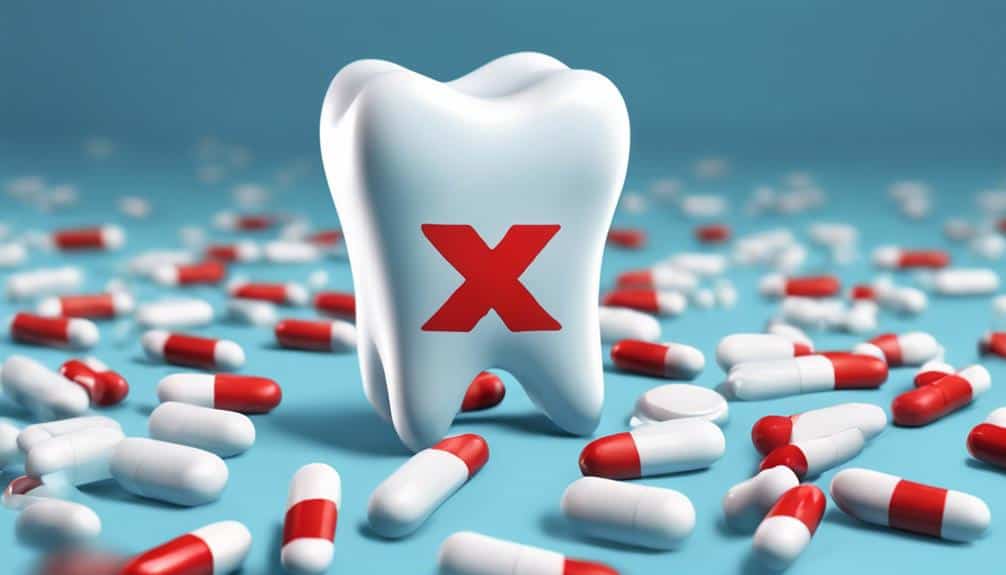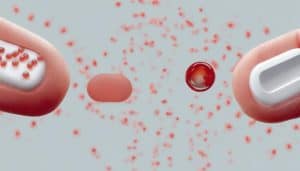You can alleviate throbbing pain after a root canal by applying a cold compress to reduce swelling and numb the area. Over-the-counter medications like ibuprofen and acetaminophen can also provide quick relief. Practice gentle oral hygiene with a soft-bristled toothbrush and non-alcoholic mouthwash. A soft food diet will minimize discomfort, and incorporating relaxation techniques, like deep breathing and meditation, can reduce stress and anxiety. Additionally, prioritize rest and relaxation to enhance the healing process. Learn more about these remedies and discover how to effectively manage post-root canal throbbing pain.
Key Takeaways
• Apply a cold compress for 15-20 minutes to reduce swelling and throbbing pain after a root canal.
• Take OTC medications like ibuprofen and acetaminophen as directed to alleviate throbbing pain and reduce inflammation.
• Practice gentle oral hygiene with a soft-bristled toothbrush and non-alcoholic mouthwash to prevent further irritation.
• Eat a soft food diet and chew on the opposite side of the treated tooth to minimize discomfort and promote healing.
• Incorporate rest and relaxation techniques, such as deep breathing and meditation, to reduce stress and anxiety, promoting the healing process.
Cold Compress Therapy
Applying a cold compress to the affected area is a simple yet effective way to reduce swelling and alleviate throbbing pain after a root canal. You can use cold compress therapy to numb the area, providing temporary relief from discomfort.
When you apply a cold pack or ice wrapped in a cloth to the affected area, it constricts blood vessels, reducing inflammation and easing the throbbing sensation. To avoid skin damage, use the cold compress for 15-20 minutes at a time.
Consistently applying cold therapy can help manage post-root canal throbbing pain. This safe and effective method is ideal for reducing swelling and alleviating pain after a root canal.
Pain Relief With OTC Meds

While cold compress therapy can provide temporary relief, you may also consider using over-the-counter pain medications to tackle throbbing pain after a root canal. OTC medications like ibuprofen or acetaminophen can help alleviate throbbing pain by reducing inflammation and discomfort associated with post-treatment pain.
When using OTC pain relief, it's essential to follow recommended dosage instructions to manage throbbing sensations effectively. Ibuprofen is a common choice for managing throbbing pain due to its anti-inflammatory properties, which can help reduce swelling and relieve discomfort.
OTC medications provide quick and accessible relief from throbbing pain after a root canal procedure. They're easily available at pharmacies or drugstores, making them a convenient option for pain management.
Gentle Oral Hygiene Practices

To ensure a smooth recovery after a root canal, you should adopt gentle oral hygiene practices that prioritize the health of your treated tooth. This is vital in preventing post-root canal pain and promoting healing.
Here are some essential tips to keep in mind:
- Use a soft-bristled toothbrush to clean your teeth gently, avoiding vigorous brushing that may irritate the sensitive area.
- Choose a non-alcoholic mouthwash that won't dry out your mouth or aggravate the treated tooth.
- Brush and floss with care, avoiding harsh dental products that may disrupt the healing process.
Soft Food Diet for Comfort

After adopting gentle oral hygiene practices, you can further minimize discomfort and throbbing pain by focusing on a soft food diet that prioritizes your comfort during the recovery period.
A soft food diet is essential in reducing root canal pain and discomfort by avoiding irritation to the treated tooth and surrounding tissues. By consuming soft foods like yogurt, mashed potatoes, and soups, you reduce the risk of aggravating your gums and nerves. It's also important to chew on the opposite side of the treated tooth with soft foods to minimize pressure and promote healing.
Avoiding hard or crunchy foods during the recovery period is crucial in reducing throbbing pain after a root canal. Your dentist may recommend a specific soft food diet to enhance comfort and support the healing process post-root canal treatment.
Rest and Relaxation Techniques

By incorporating relaxation techniques into your daily routine, you can reduce stress and anxiety, which can greatly contribute to alleviating throbbing pain after a root canal. Managing stress through relaxation methods can minimize teeth grinding and clenching, which may exacerbate post-treatment pain. Prioritizing rest and relaxation post-root canal can enhance the body's healing process and improve overall pain management.
To promote relaxation and reduce throbbing pain, try the following techniques:
- Deep Breathing and Meditation: Practice deep breathing exercises and meditation to calm your mind and body, reducing stress and anxiety.
- Restorative Sleep: Prioritize getting adequate rest and aim for 7-8 hours of sleep per night to help your body heal and recover.
- Yoga and Mindfulness: Incorporate yoga or mindfulness practices into your daily routine to promote relaxation and reduce discomfort.
Frequently Asked Questions
How Do You Get Rid of Throbbing Pain After a Root Canal?
You're wondering how to get rid of throbbing pain after a root canal. To alleviate this discomfort, you'll need to take proactive steps. First, make sure to follow the post-operative care instructions provided by your dentist. This may include taking over-the-counter pain medications and avoiding hard or chewy foods. Additionally, consider using ice packs or cold compresses to reduce swelling and discomfort. For more tooth pain relief tips, consult with your dentist or healthcare professional to find the best solution for your specific situation.
Start by applying a cold compress for 15-20 minutes to reduce swelling.
Elevate your head while sleeping to minimize blood flow to the treated area.
Additionally, take prescribed pain relief medications as directed and avoid chewing on the treated tooth.
How Do You Stop a Root Canal From Throbbing?
You're wondering how to stop a root canal from throbbing.
To start, understand that throbbing pain is a common symptom after a root canal. It's usually caused by inflammation, infection, or irritation during the procedure.
To alleviate the throbbing, try applying a cold compress to reduce swelling, elevate your head while sleeping, and take prescribed pain relief medication as directed.
What Is a Home Remedy for a Root Canal?
You're looking for a home remedy to alleviate discomfort after a root canal. One effective solution is to rinse your mouth with warm salt water several times a day. This helps reduce inflammation and promote healing.
Additionally, you can try applying a cold compress to the outside of your cheek to numb the throbbing pain.
What Is the Best Pain Relief After a Root Canal?
You're likely feeling like you're stuck between a rock and a hard place when it comes to finding the best pain relief after a root canal. Don't worry, you're not alone!
When it comes to alleviating throbbing pain, you'll want to reach for an anti-inflammatory like ibuprofen, which is a tried-and-true solution. This trusted ally will help reduce swelling and ease discomfort, getting you back on the road to recovery in no time.



